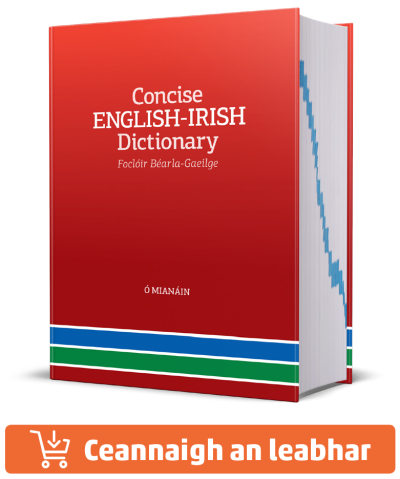Foclóir Gaeilge–Béarla
Ó Dónaill, 1977
An Foclóir Beag
Ó Dónaill & Ua Maoileoin, 1991
English–Irish Dictionary
de Bhaldraithe, 1959
Gramadach
Foghraíocht
haptan
haptatrópacht
haraicéin
haras
harlacain
harmónach
hart
haspa
hata
hatadóir
hatán
hath
hatóir
Haváíoch
hé
héach
heacsán
heacsós
héad
héadónach
héadónachas
héadónaí
Seans gur foirm é has de:
have »
CUARDACH DROIM AR AIS
IN FOCLÓIR GAEILGE—BÉARLA
ABAIRTÍ
IN FOCLÓIR GAEILGE—BÉARLA
Níl ach a rá go bhfuil ciall aige! It can hardly be said that he has any sense.
Tá a ~ aige, he has cause, reason, for it.
Níl mórán abhrais déanta aige, he has little to show for his work.
Tá teach agus talamh aige, he has a house and land.
Tá beirt mhac aige, he has two sons.
Tá comharsana maithe aige, he has good neighbours.
Tá a máthair aici, she has her mother (staying with her, helping her).
Tá duine éigin ag an madra, the dog has detected the presence of s.o.
Is aige atá an fhoighne, he has great patience.
Tá an tsláinte aige, he has good health.
Tá buntáiste aige orm, he has an advantage over me.
Tá sé imithe in ~ orm, it has become confused in my mind.
Tá ~ na háite, na tíre, ó thuaidh, the place, the country, has a northern aspect.
Tá a lámh in ~ leis, he has lost the use of his arm.
Dá mbeadh breith, greim, ar a ~ aige, if he could undo what he has done.
Tá ~ deas aige, he has a good address.
Tá sé ar m’~ ó mhaidin, it has been on my mind all day.
Tá ~ baintrí aici, she has cast off her widow’s weeds.
Is breá an ~ atá aige, he has a strong voice.
Tá an t-~ sin aige, air, he has that reputation.
Sin é a ~ riamh, that has always been his reputation.
Tá an teach in ~ aige, he has eaten all the food there was in the house.
Is beag eile atá ar a ~, he has little else to do.
Bean a bhfuil ~ aici, a woman who has a dowry.
Tá an t-airgead sin in ~ don chíos, that money has been set aside to pay the rent.
Tá aistí dá chuid féin aige, he has his own peculiar ways.
Dá mbeadh breith ar a ~ aige, if he could undo what he has done.
Is bocht an t-~ atá air, he has a poor place to live in.
Tá ~ na bó istigh, the cow has gone her time.
An fear ~, the man who is going, has just gone, out.
Tá sé ~ ina dhochtúir, he has qualified as a doctor.
Tá an talamh sin ~ le trí bliana, that land has been in lea for three years.
Is fada an muineál atá air, he has got such a long neck.
Tá sé ~, he has come over, arrived.
Tá airgead le hanamacha na marbh aige, he has money to burn.
Tháinig sé ~ go maith le bliain, he has come on well during the past year.
Tá a cheann ~ aige, he has his head up (above ground, water).
Tá an uair ~, the time has come.
Tá ~ airgid aige, he has a lot of money.
Tá an iomad ~ air, he has too much to contend with, too many to support.
Tá ~ an phinsin aige, he has reached pensionable age.
Tá sé ina ~ marbh eatarthu, neither of them has gained an advantage over the other.
Níl ~ splanc chéille aige, he hasn’t a spark of sense, he has no sense.
Níor tháinig an t-~ fós air, he has not yet reached the critical stage (of his illness).
Tá an t-~ thairis, déanta, aige, he has passed through the crisis.
Tá ceann, cosa, air, it has a head, legs.
Tá simléar, doirse, air, it has a chimney, doors.
Tá dhá thaobh air, it has two sides.
Tá gnaoi na hóige uirthi, she has the bloom of youth.
Má tá faobhar ar do scian, if your knife has a sharp edge.
